

Brain-training game launched to boost seniors' cognitive health, Singapore News. SINGAPORE - A set of mobile-phone games has been created to help boost the cognitive health of seniors.
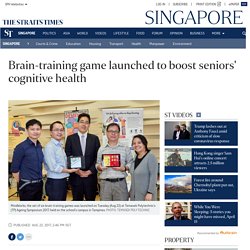
The Android games are memory-based and target people above the age of 50. They incorporate basic matching, counting and sequencing skills, with a time limit of two minutes. Called MindWorks, the set of six brain training games was launched on Tuesday (Aug 22) at Temasek Polytechnic's (TP) Ageing Symposium 2017, held on the school's campus in Tampines. Bearing the theme, "Towards Successful Ageing", the symposium focused on three key aspects of a person: physical (exercise), cognitive (brain training) and socio-emotional (mindfulness).
Researchers and students from the polytechnic teamed up with neuroscientist Ryuta Kawashima from Japan's Tohoku University to create the games to challenge an ageing brain. Professor Kawashima served as the team's adviser, and would fly in at least twice a year to check the status of the games' development.
Rewards programme motivates seniors to keep active and prevent dementia, Health News. SINGAPORE - An incentive programme that rewards seniors with redeemable points for keeping active led to marked improvement in their mental alertness and social interaction after six months.
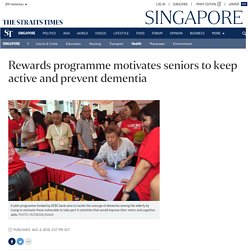
"There was also a 20 per cent increase in attendance," said Mr Keith Lee, director of Awwa Health and Senior Care. A voluntary welfare group, Awwa was formerly known as the Asian Women's Welfare Association. "Keeping our seniors physically and mentally active is key to maintaining their physical and mental functions so that our seniors can continue to live in the community," he added. He was referring to a pilot programme, funded by OCBC bank, that aims to tackle the scourge of dementia among the elderly by trying to motivate those vulnerable to take part in activities that would improve their motor and cognitive skills. Eighty seniors at the dementia day care centre at Awwa participated in the pilot project which began at the beginning of this year. Can training improve memory, thinking abilities in older adults with cognitive impairment? Cognition is the ability to think and make decisions.
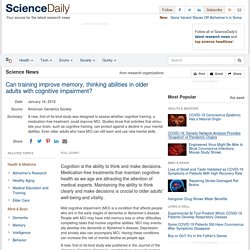
Medication-free treatments that maintain cognitive health as we age are attracting the attention of medical experts. Maintaining the ability to think clearly and make decisions is crucial to older adults' well-being and vitality. Mild cognitive impairment (MCI) is a condition that affects people who are in the early stages of dementia or Alzheimer's disease.
Older adults: Daunted by a new task? Learn 3 instead: Learning multiple things simultaneously increases cognitive abilities in older adults. Learning several new things at once increases cognitive abilities in older adults, according to new research from UC Riverside.
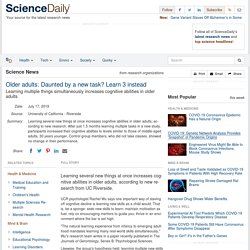
UCR psychologist Rachel Wu says one important way of staving off cognitive decline is learning new skills as a child would. That is, be a sponge: seek new skills to learn; maintain motivation as fuel; rely on encouraging mentors to guide you; thrive in an environment where the bar is set high. "The natural learning experience from infancy to emerging adulthood mandates learning many real-world skills simultaneously," Wu's research team writes in a paper recently published in The Journals of Gerontology, Series B: Psychological Sciences. Likewise, the group's hypothesis held, learning multiple new skills in an encouraging environment in older adulthood leads to cognitive growth. The prize: maintaining independence in old age. After just 1 ½ months, participants increased their cognitive abilities to levels similar to those of middle-aged adults, 30 years younger. Cognitive Health and Older Adults.
Cognitive health—the ability to clearly think, learn, and remember—is an important component of brain health.
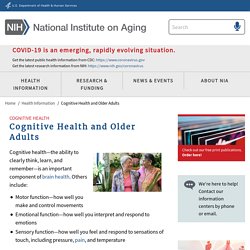
Others include: Motor function—how well you make and control movements Emotional function—how well you interpret and respond to emotions Sensory function—how well you feel and respond to sensations of touch, including pressure, pain, and temperature This guide focuses on cognitive health and what you can do to help maintain it. The following steps can help you function every day and stay independent—and they have been linked to cognitive health, too. Take Care of Your Physical Health Taking care of your physical health may help your cognitive health.
Get recommended health screenings. Eat Healthy Foods A healthy diet can help reduce the risk of many chronic diseases, such as heart disease or diabetes. In general, a healthy diet consists of fruits and vegetables; whole grains; lean meats, fish, and poultry; and low-fat or non-fat dairy products. Be Physically Active.